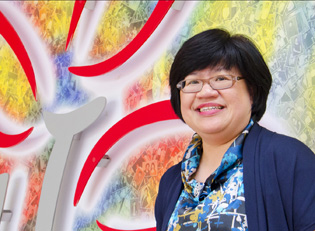Young Children’s Voices in Mathematical Problem Solving
Contributed by Dr Ho Siew Yin and Sng Wei Qin Abbie, from NTUC First Campus, for SingTeach Virtual […]
Read More
“The environment of the 21st century has shaped the way we learn,” says veteran educator Ms Ek Soo Ben. What is it about the 21st century that sets it apart from previous eras? And how has that changed the way we teach? We explore perspectives on teaching in these new times.
From her vantage point as a former teacher, principal, and now as a Deputy Director at the Academy of Singapore Teachers, Soo Ben has witnessed many changes in our education landscape.
One could say that her experience in the field is wide-ranging, but she would beg to differ.

“I won’t use the word ‘experience’ because your experience is situated, it’s contextual. Very rarely do you have an experience that is going to be replicated, like a science experiment,” explains Soo Ben.
According to Soo Ben, your experience is only as good as the lessons you’ve learned from it. “From that experience you have extracted the knowledge, skills and attributes that you can transfer. The learning is more important than the experience.”
She adds: “You are not replicating the experience – you are actually enhancing your own capacity to meet with a new one!”
Not one to keep still, Soo Ben brims with an enthusiasm for learning from new experiences. And these opportunities abound in the 21st century, where the pace of change seems to have accelerated exponentially.
In this new environment, no one person can claim dominion over every aspect of knowledge. And in today’s workplace, it is common to work in teams – often in multi-generational teams – which allows us to tap on each other’s knowledge and skills.
“We’re not negotiating in the same environment as we used to,” she notes. “Some things are less obvious, less predictable, and you just have to respond.”
We are also dealing with students who are more informed and increasingly critical. “You may still have the same skills, but the complexity of the skills and the ability to integrate the skills to make meaning in our teaching has become more demanding.”
For Soo Ben, it’s all about the mindset, rather than a skill set. “Skills can be taught, but none of us actually are born with skills.”
We don’t just teach the subject, we teach the child.
Practically, this means that teachers need to grow their repertoire of skills – and that means continually learning new skills and honing the old – in order to help students make connections and integrate what they are learning.
This willingness to learn is something Soo Ben recommends to all who teach.
“We must continue to learn, not because this is the latest buzzword or flavour of the month. But rather, if we stop learning, stop getting acquainted with the word ‘change’, the less likely we’re able to accept what comes before us.”
“You cannot know everything, neither can you experience everything,” she adds. “But at the same time, it doesn’t mean that you cannot be aware of other things.”
Clearly, the changing environment of the 21st century has shaped the way we learn – and therefore, the way we teach. But beyond the learning of knowledge and skills, Soo Ben brings us back to the purpose of education.
“We don’t just teach the subject, we teach the child. When we teach the child, whether it’s the 21st century or the 20th, there are certain things that will always be evergreen.”
The “evergreens” include values and beliefs that teachers themselves exemplify as individuals. “What we need to get the kids to do is probably what we need to get our teachers to role model,” notes Soo Ben. “You need to be seen.”
We role model collaboration, leadership, resilience, innovation and creativity in the very way we work – and our students are watching. Soo Ben reminds us, “To get the kids to function in the 21st century, the teachers’ roles are very important.”